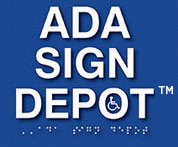It Is Time To Eliminate Offensive Terms about People With Disabilities
ADA Sign Depot
February 06, 2016
Eliminate Offensive Terms about People With Disabilities
Schools and companies often treat the ADA as a mere suggestion despite its enactment 25 years ago. In December, Preet Bharara, the U.S. Attorney for the Southern District of New York, sent a letter to the York City Department of Education stating, “the City is still not fully compliant, and children with disabilities and their families are being denied the right to equal access to a public school education.”(1) This is not news to people with disabilities.
Integrating people with disabilities requires not only strictly enforcing the ADA but also changing the perception of those with disabilities. This begins with changing our language. As Rosa’s 11-year old brother Nick said so articulately when President Obama signed Rosa’s Law eliminating the words “retarded” and “retardation” from government language, “What you call people is how you treat them.”
Certain words such as “retarded” are slowly being eliminated from our language, but there are far too many other words that appear to be entrenched in it. People may be offended when inappropriate language is brought to their attention. The perception is that the person complaining is acting as the “politically correct” police rather than that the term used just insulted a class of people. We changed how we refer to people based on race, religion, gender, and sexual orientation, but somehow it appears acceptable to use outdated language to refer to people with disabilities.
The “H-word” or “handicapped” should be the first to go. It allegedly derives from a beggar with a cap in hand or “hand-cap.” Using the label reinforces the antiquated perception that providing access to people with disabilities is charity for beggars rather than equal access or a human/civil right. Yet the label “handicapped” appears on parking signs throughout the country rather than “accessible.” The word should describe the nature of the location and not the person.
“Hearing impaired’ is another description that is offensive to many. Barbara Kelley, acting executive director of the Hearing Loss Association of America (HLAA) says, ” ‘Hearing impaired’ has a negative connotation. ‘Hard of hearing’ or ‘deaf’ are the preferred terms but both need to be used together to include the full group as ‘people who are deaf or hard of hearing’.” Likewise, “wheelchair bound” implies that the person is tied to a wheelchair rather than using a wheelchair, and “suffers from” indicates that the person is a victim rather than that he or she has a disability.
These negative terms not only pervade conversational language but are also reinforced by the media. The press regularly uses “the disabled” as a noun rather than “people with disabilities,” which shifts the disability to a descriptive adjective. Person-first terminology acknowledges that the disability is an attribute, like hair or eye color, and not the whole of the person. New York State passed legislation requiring government agencies to use person-first terminology, but most of the government agencies are unaware of the ruling. See A04375
Arizona State University’s Walter Cronkite School of Journalism and Mass Communication developed the NCDJ Disability Language Guide to aid journalists with the appropriate phrases to use when reporting on people with disabilities. They recommend a more neutral description of the disability such as “He is hard of hearing.” Yet journalists often fail to update their language. The AP Stylebook is sorely out of date.
Full integration will not happen with legislation alone. We need to overhaul our outdated language if the goal is to truly change negative perceptions about people with disabilities. #NoLabels
(1) https://www.justice.gov/usao-sdny/pr/statement-us-attorney-preet-bharara-letter-new-york-city-department-education-about
Follow Janice S. Lintz on Twitter: www.twitter.com/Janiceslintz
- Tags: ADA People Subscribe to this blog's RSS feed.



